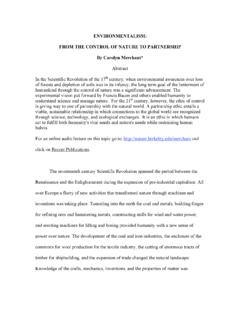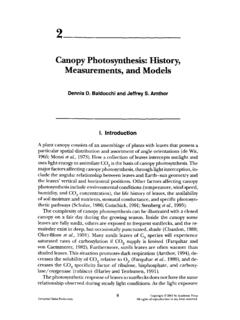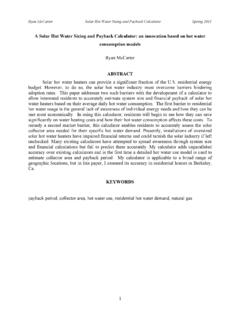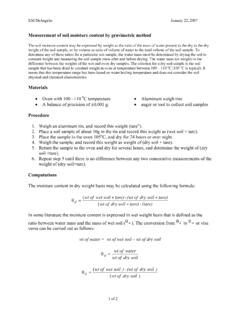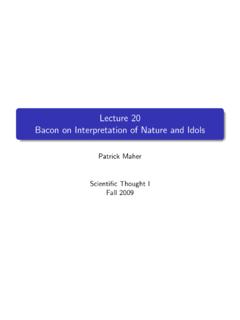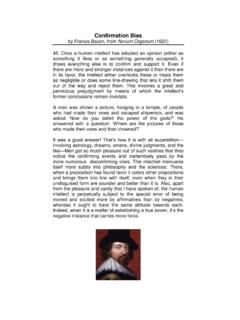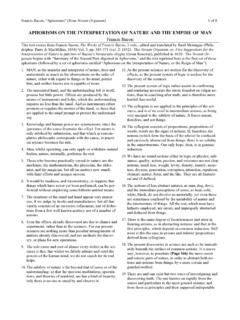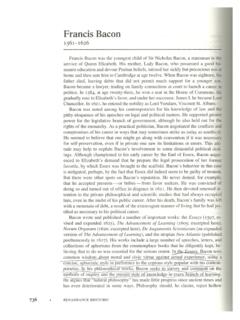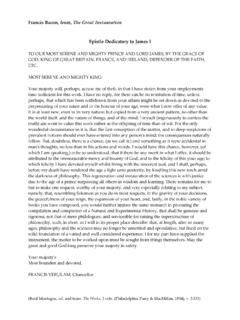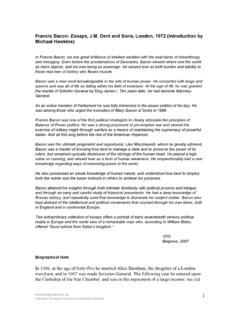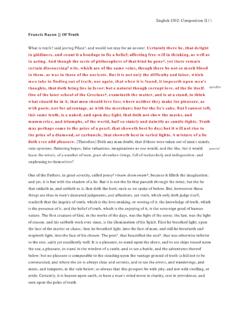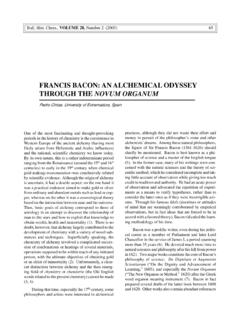Transcription of “The Violence of Impediments” - UC Berkeley College of ...
1 CRITIQUES AND CONTENTIONS The Violence of impediments francis bacon and the Origins ofExperimentationBy Carolyn Merchant*ABSTRACTF rancis bacon s use of metaphors to characterize his nascent concept of experimentationmust be interpreted within the historical context of his time. His approach to experimen-tation is one in which nature is constrained by the Violence of impediments and is madenew by art and the hand of man. His language about nature should be placed in thecontext of the history of the contained, controlled experiment, a concept that emerges fromjuridical practice, from the idea of nature in bonds, and from the tradition of the secretsof nature in settings such as the courtroom, the anatomy theater, and the bacon (1561 1626) played a formative role in the emergence of thecontained, controlled experiment. From his early writings in the 1590s to his matureconcept of the experiment in the 1620s, he struggled by means of vivid metaphor to definea new method of gaining truth about the natural efforts of classical and* Department of Environmental Science, Policy, and Management, University of California, Berkeley ,California am grateful for discussions with and comments from Roger Hahn, Donna Haraway, David Kubrin, HaydenWhite, David Winickoff, and have used and compared a number of editions and translations of francis bacon s texts in this otherwise noted, Works refers to francis bacon ,Works, ed.
2 James Spedding, Robert Leslie Ellis, andDouglas Devon Heath, 14 vols. (London: Longmans Green, 1875); reference to these volumes will often appearin parentheses following mention of a specific title. Other translations subsequently cited by editor includeBacon,The Philosophical and made English, from the Originals, with Occasional Notes,to explain what is obscure.. , by Peter Shaw, 3 vols. (London: J. J. and P. Knapton, D. Midwinter and A. Ward,and others, 1733); bacon ,Works, ed. and trans. Basil Montagu, 3 vols. (Philadelphia: Parry & MacMillan, 1857);Isis,2008, 99:731 760 2008 by The History of Science Society. All rights $ writers that led merely to individualistic and arcane insights became a foilagainst which he developed a new mode of extracting secrets from nature. His vastknowledge of ancient and contemporary writers, in combination with his judicial life inthe service of Elizabeth I and James I of England, contributed elements to the languagehe used to describe his new method.
3 Of equal importance to his metaphorical style,however, was his immersion in the cultural, social, and economic fabric offin-de-sie`cleEurope and the physical settings of his everyday appreciate the significance of bacon s achievement, one must go beyond a textualanalysis of the words he used in his published writings. It is necessary to examine theemergence of his nascent concept of the contained, controlled experiment. The ingredientsof his idea included an active inquisitor (scientist) who posed a question, a subject/objectthat held the answer as a veiled secret, witnesses who could verify and if necessaryreplicate the experience, and a practical outcome that would improve the life of human-kind. Although ambiguity may exist about the meanings of some of bacon s terms, theirrelevance becomes clear if they are placed in the context of his I explicate bacon s movement toward the concept of the contained, controlledexperiment in ways not heretofore discussed by historians (who have mainly focused onhis inductive method) and respond to critics such as Peter Pesic who have debated hismetaphors and respect and appreciate Pesic s research arguing that Bacondid not use the words nature on the rack or torturing nature to reveal her secrets, although later authors have attributed those sayings to argue, however, thatBenjamin Farrington,The Philosophy of francis bacon (Liverpool: Liverpool Univ.)
4 Press, 1964); bacon ,Novum Organum, trans. Michel Malherbe and Jean-Marie Pousseur (Paris: Presses Univ. France, 1986); bacon ,The New Organon, ed. and trans. Lisa Jardine and Michael Silverthorne (Cambridge: Cambridge Univ. Press,2000); and bacon ,TheInstauratio magna,Pt. 2:Novum organumand Associated Texts, ed. Graham Rees withMaria Wakely (Oxford francis bacon , 11) (Oxford: Clarendon, 2004). For a comprehensive list of editions andtranslations of bacon s works to 1750 see R. W. Gibson, francis bacon : A Bibliography of His Works and ofBaconiana to the Year 1750(Oxford: Scrivener, 1950).2 Peter Pesic, Proteus Rebound: Reconsidering the Torture of Nature, Isis, 2008,98:304 317 (hereafter citedasPesic, Proteus Rebound ); Pesic, Wrestling with Proteus: francis bacon and the Torture of Nature, ibid., 1999,90:81 94 (hereafter cited asPesic, Wrestling with Proteus ); Pesic, Nature on the Rack:Leibniz s Attitude towards Judicial Torture and the Torture of Nature, Studia Leibnitiana, 1997,29:189 197;Carolyn Merchant, The Scientific Revolution andThe Death of Nature, Isis, 2006,97:513 533 (part of aspecial Focus section entitled Getting Back toThe Death of Nature: Rereading Carolyn Merchant ) (hereaftercited asMerchant, The Scientific Revolution andThe Death of Nature ); Merchant, Secrets of Nature: TheBacon Debates Revisited, Journal of the History of Ideas, 2008,69:147 162; Merchant,The Death of Nature:Women, Ecology, and the Scientific Revolution(San Francisco: HarperCollins, 1980) (hereafter cited asMerchant,Death of Nature); and Merchant,Reinventing Eden: The Fate of Nature in Western Culture(NewYork: Routledge, 2003).
5 3 Pesic states that works like Carolyn Merchant sThe Death of Naturerely on such imagery , thetorture of nature (Pesic, Proteus Rebound, p. 305). My argument in the book does not rely on the tortureof nature, and to make such a claim is a serious misrepresentation of the argument there. I didnotclaim thatFrancis Baconadvocatedthat nature should be tortured or put on the rack in order to reveal her secrets (ibid.[emphasis added]). Ididuse the term torture in my chapter on bacon . I stated that bacon s imagery treatsnature as a female to be tortured through mechanical inventions and stronglysuggeststhe interrogations of thewitch trials and the mechanical devices used to torture witches (Merchant,Death of Nature, p. 168 [emphasisadded]). I stated that the interrogation of witches as symbol for the interrogation of nature, the courtroom asmodel for its inquisition, and torture through mechanical devicesas a tool for the subjugation of disorderwerefundamental to the scientific method as power (ibid.)
6 , p. 172 [emphasis added]). To say that the fact that theinquisition and the torture of witches were prevalent in bacon s cultural milieu and subtly influenced hislanguage ( , the inquisition of nature ) is not the same as stating that Baconadvocatedtorture. Moreover,agreeing with Pesic that Leibniz may have been the first to attribute to bacon the idea of putting nature on therack does not mean (as he claims) that I believe that Leibniz himself advocated those views (Pesic, ProteusRebound, p. 314). Similarly, quoting a paragraph from Thomas Kuhn in which he (erroneously) attributes thephrase twisting the lion s tail to bacon does not mean that I agree with Kuhn that bacon used that particular732 THE Violence OF impediments bacon s concept of experiment entailed a nature constrained by the Violence of imped-iments and transformed by art and the hand of man. 4I disagree with Pesic that thedominant assessment of bacon s approach to science historically was or should be that ofa heroic struggle with nature,5in which he confronts her inherent greatness 6and inwhich both the scientist and nature.
7 Are tested and purified ( , wrestling withProteus ).7I show instead how the contained, controlled experiment emerges fromphrase (ibid., pp. 313 314). Moreover, to imply that I blame bacon and science for abusive experiments andecological disaster (ibid., p. 308) contradicts my statements inThe Death of Naturethat bacon was notresponsible for subsequent uses of his philosophy (Merchant,Death of Nature, p. 165) and in The ScientificRevolution andThe Death of Nature that obviously bacon cannot be held individually responsible for thepositive or negative implications or applications of his ideas (Merchant, Scientific Revolution andThe Deathof Nature, p. 533). To claim that I hold the view that because science and experimenthavebeen abused, theymustbe intrinsically abusive is a serious distortion of my argument (Pesic, Proteus Rebound, p. 308). In my2006 IsisFocus paper, The Scientific Revolution andThe Death of Nature, I argued that witch trials servedas models of interrogation to reveal hidden secrets that could be used to convict the accused and levy the deathsentence (p.)
8 525) and that to [later philosophers], the rackexemplifiedthe constraint of nature in a closed,controlled system, responding to questions posed by an inquisitor before witnesses the very core of experi-mentation itself (p. 528 [emphasis added]). It was in this sense that I rather brashly concluded that bacon sefforts to define the experimental method were buttressed by his rhetoric and that the very essence of theexperimental method arose out of techniques of human torture transferred onto nature (ibid., p. 532), and Pesicand Alan Sokal are right to question that last phrase (the latter in a private communication). There are indeedother contexts out of which the idea of the contained, controlled experiment emerged in the seventeenth century,three of which I discuss later in this ,De Augmentis Scientiarum, Bk. 2, Ch. 2 (Works, Vol. 4, p. 295); and bacon ,Parasceve, Aphorism1(Works, Vol. 4, p. 253). See Tables 1, 2, and 3 and ensuing discussion.
9 Because of ambiguities in the meaningsassociated with the Latin word vexare ( vex ), some early (as well as recent) bacon scholars have interpretedBacon s Latin to mean the torture of nature. (See notes 30, 39, 47, 58, and 77, below, and Table 3.)5 Pesic, Wrestling with Proteus, pp. 81, 93. There are many possible readings of bacon , and I suspect thatPesic and I will have to agree to disagree on the meanings and interpretations of many of bacon s metaphors andtheir historical impact. Even if bacon could be shown to have thought of his own work as a heroic struggle thatwill ennoble humanity, that was not his primary message to the world or why his work was of such fundamentalimportance for history. Pesic, of course, is entitled to his own opinion, based on his own selection of texts andhis own reading of them; nor do I believe that his opinion will change based on other interpretations, otherreadings, or my arguments herein; but perhaps a truce can be called.
10 Pesic assigns benign meanings to wordssuch as force, vex, and hound and does not discuss terms such as power, empire, and dominion thatwere at the crux of bacon s program for the improvement of humankind; nor does he place bacon s work in thelarger political and economic context of his times. Certainly some of bacon s metaphors, terms, and examplesare indeed benign and nonviolent (see the ensuing discussion), as is appropriate to his overall goal of mimickingand speeding up nature s processes through art and experiment, but the vast majority of them implied some formof Violence toward disagree with Pesic that bacon held that man cannot enter nature s inner courts without confrontingherinherent greatness (here Pesic himself represents nature as female) (Pesic, Wrestling with Proteus, p. 93[emphasis added]). In the preface toThe New Organon, bacon joins the conquering of nature with thepenetration of its inner chambers and does not use the phrase her inherent greatness.
